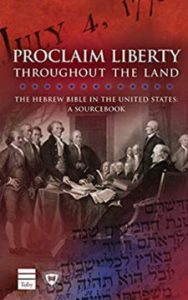 Proclaim Liberty Throughout the Land
Proclaim Liberty Throughout the Land
The Hebrew Bible in the United States: A Sourcebook
Meir Y. Soloveichik, Matthew Holbreich, Jonathan Silver and Stuart W. Halpern, Editors
The Toby Press, LLC
This book may seem something of a departure – both for our occasional reviews and for Yeshiva University, whose imprint graces this book. One realizes that the latter is less of a departure than it may have seemed initially when it becomes apparent that this work was compiled under the auspices of Yeshiva University’s Zahava and Moshael Straus Center for Torah and Western Thought. That’s what this book represents: the synthesis of Torah (in the form of the Hebrew Bible) and Western thought (in a variety of ways).
It’s no secret that, from the Pilgrims to the Continental Congress to the abolitionists, America was founded and her course was laid by men of faith, if not our faith. Given that the Christian Bible includes the Jewish Tanach in its canon, these founders’ ideologies were as likely to reflect the words of the Avos as those of the Apostles. This book represents an examination of the impact of the Jewish Bible on the early days of our country. (And by early, we mean early: the work starts with the 1620 Mayflower Compact, predating American independence by more than a century and a half.)
Make no mistake: this is most emphatically not an examination of Jewish history. In fact, there is nary a Jew to be found! (The members of the Hebrew Congregation at Newport make a passive cameo as recipients of a letter from George Washington.) Rather, this is very much the story of such people as John Witherspoon, Cotton Mather, Frederick Douglass, Brigham Young and Julia Howe – people who helped to shape America, and the Book that helped to shape them.
What’s most striking, perhaps, is that the Bible is so broad, so all-encompassing, that it can be cited as proof for positions on both sides of virtually any philosophical debate (a phenomenon not unfamiliar to us today). This is particularly notable in the debate over slavery, in which the Bible was brought out to support both the slaveholders’ position and that of the abolitionists (to say nothing of the slaves themselves, in the form of Bible-based spirituals). As the editors of the current work point out, each side of the slavery debate relied upon different aspects of the Bible, such as advocates of the institution invoking such things as the “curse of Ham,” and their spins on such things are not necessarily consistent with our own traditional understanding of such matters.
While not addressed in this work, Benjamin Franklin has some aphorisms in Poor Richard’s Almanack that echo Talmudic dicta. For example, “When the Wine enters, out goes the Truth” (1755) expresses an idea that originates in tractate Sanhedrin (38a). I have often wondered whether Franklin was plagiarizing Ravina and Rav Ashi or if perhaps he just got lucky, albeit several times. Similarly, this book raises the possibility that perhaps the Founding Fathers may have had surprisingly thorough Jewish educations. The source materials cited in the analyses are typically limited to the Bible verses to which the various speakers or writers were referring. The occasional source citing a mishna or a midrash, however, makes one wonder how much Thomas Paine was quoting and how much he was coming up with the same ideas as Chazal by using common sense. (Sorry, I couldn’t resist!)
The anthology concludes with the Civil War. The authors acknowledge that such a work could be brought up to today, since the Hebrew Bible does continue to inform the American story. Realistically, however, the Bible has represented a decreasing voice in the political narrative over the decades. As interesting as it might be to see chapters devoted to such topics as manifest destiny and prohibition, Proclaim Liberty… does conclude at a logical stopping point. The authors do include an appendix on the Civil Rights movement, with particular emphasis on Dr. King, which serves as an interesting coda to the chapter on slavery and abolition that precedes it.
While this book will no doubt be of particular interest to American history buffs, it need not be limited to them. Consider my aforementioned list giving examples of some whose works are examined in Proclaim Liberty…: John Witherspoon, Cotton Mather, Frederick Douglass, Brigham Young and Julia Howe. Those who don’t know who those people are might say, “This book is not intended for me.” Quite the opposite! This is our American cultural history and it behooves us all to be familiar with such people. If we’re not already, then what better way to become familiar than through a work that places their vision within a framework we already understand?
Rabbi Jack Abramowitz is Torah Content Editor at the Orthodox Union. He is the author of six books, including The Tzniyus Book and The Taryag Companion. His latest work, The God Book, is available from OU Press as well as on Amazon.
The words of this author reflect his/her own opinions and do not necessarily represent the official position of the Orthodox Union.

